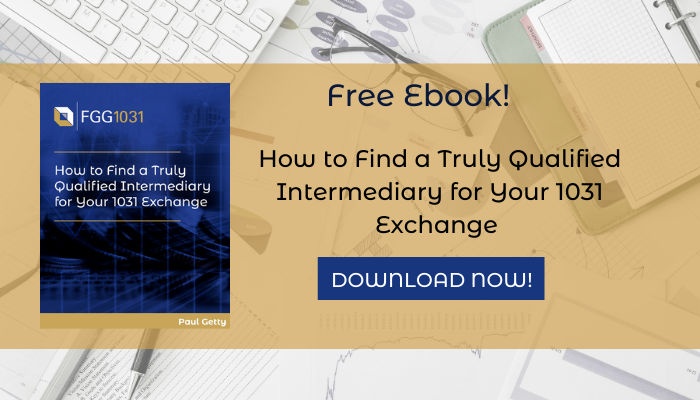Investors looking for a Qualified Intermediary (QI) to help facilitate a 1031 exchange must use the power of elimination to determine who can serve in that role because the IRS specifies only who cannot.
A QI is required to facilitate every 1031 exchange, the process in which an investor defers capital gains and depreciation taxes by selling one real estate investment and reinvesting the proceeds in a like-kind real estate investment of equal or greater value. The QI, documents potential replacement properties, safeguards the proceeds from the relinquished property in a bank, and transfers the property deeds to the investor at the conclusion of the exchange.
IRS rules state “You cannot act as your own facilitator. In addition, your agent (including your real estate agent or broker, investment banker or broker, accountant, attorney, employee or anyone who has worked for you in those capacities within the previous two years) cannot act as your facilitator.”
Who can’t be your QI in more detail
Most of the disqualifying factors are in place to avoid conflicts of interest. Agents, employees, and business partners might have difficulty representing your best interests, especially if there is an existing financial relationship.
The IRS warns of recent incidents in which QIs defrauded clients or declared bankruptcy and were unable to complete the exchange. Ultimately, you must conduct your own due diligence and select someone who has extensive experience facilitating 1031 exchanges, can provide references, and will fit your individual circumstances.
A successful 1031 exchange involves identifying potential replacement properties within 45 days following the sale of the original property and closing on the like-kind replacement property within 180 days. Any problems arising with a QI in the middle of a 1031 exchange would likely doom the process and disqualify the tax deferral.
By going into detail about why certain individuals can’t represent you as a QI, it will become clear who is fit to serve.
Rules against representing yourself
In the same way it is often inadvisable to serve as your own attorney, the same is true in a 1031 exchange where it would be difficult to provide yourself with unbiased, independent counsel.
More importantly, a crucial component of a 1031 exchange is that the investor never takes possession of the proceeds from the sale of the relinquished property. By having a QI, a neutral party takes possession of the funds, the investor avoids a taxable event, and is able to defer capital gains and depreciation taxes.
Why your agent can’t be your QI
Your real estate agent, financial advisor, and tax attorney may be a logical choice as a QI because they are intimately involved in your finances and have already earned your trust. However, it may be difficult to put the investor’s best interests first in a dual role so the IRS states those who have been agents for an investor in the previous two years are precluded from also serving as a QI.
There are exceptions to this rule for those who have had only minimal financial relationships with the investor, such as escrow agents.
Employees and business partners
Employees could potentially be pressured to skirt rules or face consequences in their workplace should things go south with the 1031 exchange. Business partners also are not eligible because they might have the ability to pressure the investor about replacement properties or might be tempted to misuse the funds from the sale of the original investment.
The employees who work for any of your agents also are not eligible to serve as your QI.
Who can be your QI in a 1031 exchange
While agents, employees, and business partners can’t serve as your QI, they may have relationships with experienced QIs or can help point you in the right direction.
An experienced QI should be willing to provide details about 1031 exchanges for which they have facilitated, detail how they plan to handle the proceeds from your relinquished property, provide a written copy of internal controls, and provide references who you can contact.
Finding an experienced QI can be a key to making a 1031 exchange a stress-free experience that results in a successful tax-deferred exchange.
As always, we recommend speaking with your tax advisor. Contact us with questions about how to get started.
For an in-depth look at the QI role and how to find one that will fit your objectives, download our eBook How to Find a Truly Qualified Intermediary for Your 1031 Exchange, available now!









Your Comments :